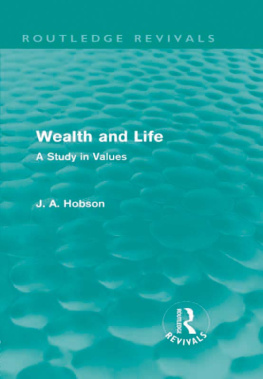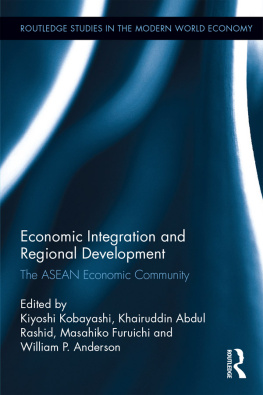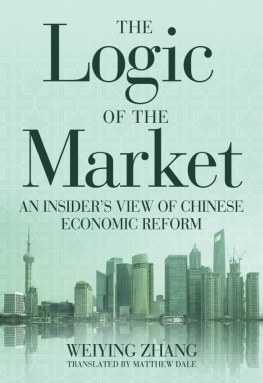ECONOMY'S TENSION
The Dialectics of Community and Market
Stephen Gudeman
Berghahn Books
New York Oxford
Published in 2008 by
Berghahn Books
www.berghahnbooks.com
2008, 2012 Stephen Gudeman
First paperback edition published in 2012
All rights reserved. Except for the quotation of short passages for the purposes of criticism and review, no part of this book may be reproduced in any form or by any means, electronic or mechanical, including photocopying, recording, or any information storage and retrieval system now known or to be invented, without written permission of the publisher.
Library of Congress Cataloging-in-Publication Data
Gudeman, Stephen.
Economy's tension : the dialectics of community and market / Stephen Gudeman.
p. cm.
Includes bibliographical references.
ISBN 978-1-84545-514-9 (hbk.)--ISBN 978-0-85745-788-2 (pbk.)
1. Economic anthropology. 2. EconomicsSociological aspects. I. Title.
GN448.2.G84 2008
306.3dc22
2008008212
British Library Cataloguing in Publication Data
A catalogue record for this book is available from the British Library
Printed in the United States on acid-free paper
ISBN: 978-0-85745-788-2 (paperback) ISBN: 978-0-85745-799-8 (ebook)
 ACKNOWLEDGEMENTS
ACKNOWLEDGEMENTSIn the course of writing this book I have been fortunate to receive comments and ideas from numerous colleagues including James Carrier, David Graeber, J-K Gibson Graham (Julie Graham and Katherine Gibson), Chris Hann, Arjo Klamer, Frederique Appfel-Marglin, David Ruccio, Will Milberg, Ivo Strecker, and Thomas Wallgren. Over the years, Keith Hart and I have sustained a conversation on economic anthropology, and he has been a supporter and helpful critic. I thank as well the Austrian economics group at George Mason University who provided me with many comments on an earlier version of . Stephen Marglin and I independently reached the idea of two forms of epistemology, and I have been fortunate to learn his thoughts on economics. Portions of the book were presented at the Max Planck Institute for Social Anthropology in Haale, and I appreciate the support of Chris Hann and his colleagues. I am especially indebted to the Swedish Collegium for Advanced Study in the Social Sciences in Uppsala, where I began this work as a fellow in 200203. I thank its directors, Bjrn Wittrock, Barbro Klein, and Gran Therborn, and my helpful colleagues there, especially Patricia Springborg. During that academic year, Steffan Lfving organized a conference on my work at the University of Uppsala and published the results as a book (Lfving 2005). I am very grateful to him for his thoughts and support, and to the book's contributors, whose responses partly stimulated this volume.
A version of some material in Chapters appeared in 2006 as Trade's Reason, Max Planck Institute for Social Anthropology Working Paper no. 81, Haale/Saale. ISSN 1615-4568.

1
MODELS, MUTUALITY, AND TRADE
Why are we obsessed with calculating our selections? Why must we always make the best choice to feel satisfied? For many of us, rational selection is like a grammar: we use it to form acceptable statements and actions, and we invoke it to persuade others. We even value the act of choosing itself. But why does calculative reason dominate the lives of many in market economies, especially in the United States? Is it part of our genetic inheritance? Are we naturally avaricious? Have profit-seeing producers drawn us into their way of life? If so, how do we explain their calculated cravings and understand cross-cultural differences in the prominence of profit making? In this essay, I argue that calculative reason develops and expands with competitive trade.
If this answer to a complex question seems brief, it had a long birth. My puzzlement about the salience of calculated choice began during my initial fieldwork in Panama, but I did not frame it as a puzzle until I left the country and undertook more field studies. In Panama I lived with my wife in a small village where the people were shifting from the subsistence farming of rice, maize, and beans to cash cropping sugar cane. I wanted to study this transition and began by sketching decision-trees that captured their flow of choices and by soliciting their subjective probabilities for the outcomes in order to understand their crop selections. I quickly found that my questions about rational choice did not resonate with them, nor did the concept explain the social and economic conditions in which they were living. I dropped that analysis to study their material life ethnographically as well as other aspects of the culture. But I was puzzled about the gap in our reasoning.
After this work, I realized that my puzzle about the prominence of calculated choice lies at the heart of a disagreement in economic anthropology, evokes a difference between anthropology and economics, and often separates the social sciences, if not the social sciences and the humanities. In anthropology, Bronislaw Malinowski's (1961 [1922]) early critique of the concept of rational man had a subterranean influence on subsequent generations of anthropologists. Were the Trobriand Islanders, whom he so carefully studied, self-interested choosers, or were they acting according to other modes of reason, such as reciprocity? Two of his students burned the candle at both ends. In the style of Malinowski, Raymond Firth provided innumerable contextual studies of the Pacific island of Tikopia, but with his early training in economics Firth emphasized how the people chose to their advantage within constraints (1951, 1964, 1965 [1939]). Edmund Leach, in a famous study of politics in Highland Burma (1954), explicitly presumed that the actors were choosing and maximizing political rewards even as he presented a cultural, structural, and contextual analysis of their polity. The issue was most clearly revealed in the internal anthropological debate during the 1960s between the formalists, who followed a neoclassical, deductive line that centers on the supposed universality of economic man, and the substantivists, who were developing an institutional and inductive perspective based on Karl Polanyi's work.
These controversies reflect a larger issue in the social sciences: whether to adopt an individualistic or a relational understanding of society, a debate that might be encapsulated as the difference between Adam Smith's The Wealth of Nations (1976 [1776]), and Emile Durkheim's The Division of Labor in Society (1933 [1893]) and The Elementary Forms of Religious Life (1995 [1912]). Leaving aside his earlier work The Theory of Moral Sentiments (1976 [1759]), Smith is often seen as the founder of modern economics and is famous for his pithy statement that places self-interest with its benefits at the center of markets:
It is not from the benevolence of the butcher, the brewer, or the baker that we expect our dinner, but from their regard to their own interest. We address ourselves, not to their humanity but to their self-love, and never talk to them of our own necessities but of their advantages. (1976 [1776]: 18)










 ACKNOWLEDGEMENTS
ACKNOWLEDGEMENTS 1
1